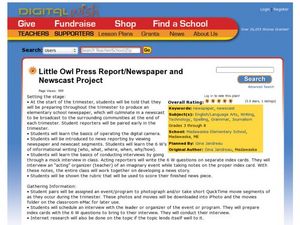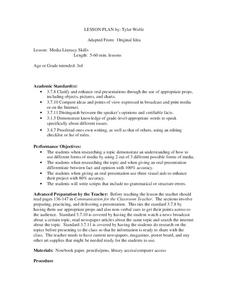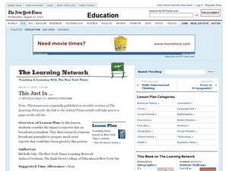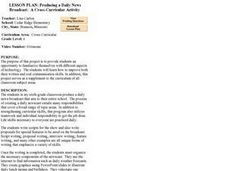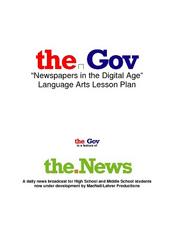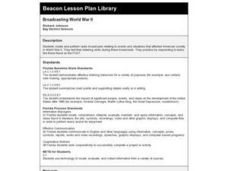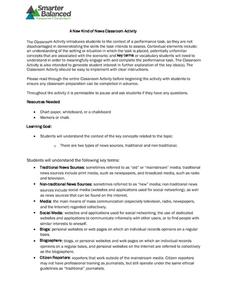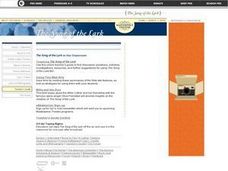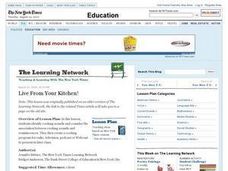Curated OER
Little Owl Press Report/Newspaper and Newscast Project
Discover journalistic techniques by having learners prepare and write their own class newspaper. They discuss the five W's of investigative journalism and conduct interviews with school figures. They utilize video technology, podcast...
Curated OER
Turn On, Tune In, and Write Down
Students locate, access and listen to a variety of radio and audio samples found on the Internet. They discuss the material in small groups and identify areas of interest for further discussion.
Curated OER
Create a Weather Newscast
Fourth graders explore and study basic weather terms, strengthen research skill on the web and create a weather newscast. They choose a weather site on the web, copy weather maps and create a videotape based on a written script to...
Curated OER
Media Literacy Skills
You're on camera! Third graders find a news story and research it to get more information. Everyone uses their found information to write a script and create their own news broadcast!
Curated OER
This Just In…
Students consider the impact a reporter has on broadcast journalism. They research a famous broadcast journalist to prepare a mock news report.
Curated OER
Be a Weather Newscaster
Ninth graders, in groups, create and videotape a news broadcast. Each group researches, develops and writes a weather forecast, a commentary on an environmental concern, a school activity and a commercial.
Curated OER
Producing a Daily News Broadcast: A Cross-Curricular Activity
Sixth graders create a daily newscast which they broadcast to the whole school. They write the scripts for the broadcast, after reviewing interviews, feature writing, and proposals. They organize the newscast for presentation and edit...
Curated OER
News Broadcasts
Learners create a news broadcast after studying example broadcasts about disaster relief organizations. In this broadcast news lesson, students research disaster relief organizations and then write a news broadcast related to a disaster....
Newseum
When the News Media Make Mistakes
Mistakes happen. When they happen in news reporting, be it in print or on the internet, journalism ethics requires that the errors be corrected. Young journalists use an Accuracy Checklist to track how news organizations post corrections...
Maine Content Literacy Project
Introduction to Literacy Criticism
As learners continue to examine a short story of their choice, they take some time to look at analysis completed by others on the same story. In the eleventh lesson in a series of fourteen, pupils explore various sites for literary...
The New York Times
Stress Less: Understanding How Your Mind and Body Respond to Anxiety
What could be more relevant to teens and preteens than experiencing stress? Use an article from the New York Times website to practice valuable Common Core skills for informational text reading, and also get a discussion going in your...
Curated OER
Back to the Past
What was the Untied States like in 1938? What were the concerns of Americans in the post World War I era? What were their fears? What were their sources of news and entertainment? To understand the reaction to Orson Welles' radio...
Curated OER
Fighting Fake News
Fake news. Alternative facts. Internet trolls. In an age of Newspeak, it's increasingly important to equip 21st century learners with the skills needed to determine the legitimacy of claims put forth on social media, in print, and in...
Curated OER
Newspapers in the Digital Age
Is journalism more or less reliable with the influx of Internet sources? Learners investigate the issues of freedom of speech, journalistic ethics, and social responsibility in the age of Twitter and Facebook. After examining the...
Curated OER
Broadcasting the News Lesson 6
Students practice news reading at three words per second. They produce a news program while working as a team of reporters. They watch news clips of current reporters making a list of news reading tips. They play an online game that...
Curated OER
Broadcasting World War II
Third graders listen to several broadcasts from the WWII era. They research, write and perform simulated radio broadcasts concerning topics related to American society in World War II.
Curated OER
Voice of History
Way before the digital age radio was the medium of popular culture. After listening to excerpts from radio programs (easily available on the Internet), participants return to the radio age by creating a two-minute sketch based on a...
Smarter Balanced
A New Kind of News
Newspapers and broadcast news. Social media, blogs, and blogospheres. Class members generate a list of news sources they use to get information about events. The big idea here is to introduce the necessary vocabulary and to establish a...
Curated OER
Numbers Scavenger Hunt
Students use computers and Internet to research specified topics using given sites. They print the researched information, and create a PowerPoint presentation.
Curated OER
The Song of the Lark
Using the internet, class members research the biography of Willa Cather, view photographs of Red Cloud, Nebraska, and read the novel, The Song of the Lark. They discuss the film, its setting and characters, and explore the...
Curated OER
News
How does broadcast news differ from accounts reported in newspapers? On the radio? Through the Internet? Middle schoolers discuss the news and speak about the differences between news in print and broadcast news. Given a list of six...
Curated OER
World War II
Sixth graders read Under the Blood Red Sun (UBRS), V is for Victory (V), and Number the Stars(NS). They examine WWII through the eyes of Japanese, Danish, and American students and complete at least two projects: a radio broadcast and a...
Curated OER
George Lucas and the Power of Myth
Students examine the contributions of George Lucas to society. They analyze the concept of a hero, conduct Internet research on the life of George Lucas, develop a Hero Attribute Chart, and create an artistic rendering representing the...
Curated OER
Live From Your Kitchen!
Learners identify cooking sounds and share opinions about their associations. After reading an article, they discover the growth of radio cooking shows. They prepare an outline and script for a cooking program and present their...
